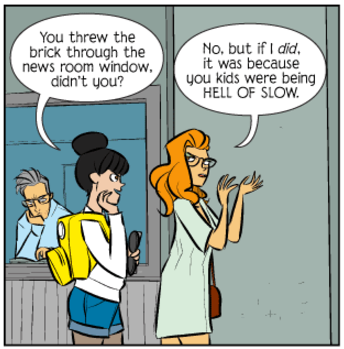Archive for April, 2017
Weak t
Yesterday I claimed that "if you examine a random stretch of English speech closely, within 10 seconds (of speech time, not your analysis time) you'll notice an instance of an interesting general pattern that has never been systematically studied in the linguistic literature." And I promised to test that claim on a clip from the S-Town podcast, which I happened to have at hand because I was adding it to a portfolio of English intonational examples. (To make it a fair test — though of course this is an illustration of my claim, not a proof — I'm looking for an "interesting general pattern" that's not in the area of intonation.)
But first, let's take a look at another sample from the intonation portfolio, President Donald Trump's weekly address for 3/10/2017. Mr. Trump starts this way:
Read the rest of this entry »
The political dangers of mispronunciation
From Chinascope (4/3/17):
Party Officials Criticized for Mispronouncing Words during Public Speech
A Duowei News [Multidimensional News] article quoted an article from Jiefang Daily [Liberation Daily] on March 30 which sharply criticized a number of party officials for mispronouncing words during their public speeches and said that the phenomenon resulted in quite a lot of laughter and jokes in China. Some of the officials were reported to have even repeated the same mistakes at several locations. These officials were criticized for poor language skills and knowledge while the people around the officials were reportedly too scared to make any corrections or to say “No” to certain of their bosses’ inappropriate behavior. As Duowei reported, the Jiefang Daily article questioned whether mispronouncing the words was simply mispronouncing the words or if it sent another kind of alarming signal.
Source: Duowei News, April 1, 2017
http://china.dwnews.com/news/2017-04-01/59808599.html
Read the rest of this entry »
The over/under on linguistic discovery
Geoff Pullum, "The world's greatest grammarian", Chronicle of Higher Education 4/3/2017 [emphasis added]:
We mostly did 11-hour days, starting as soon after 7 a.m. as we could and working till 6 p.m., breaking for a short lunch at 1 p.m. to discuss the morning’s work. Virtually every day we would find over our sandwiches that we had discovered something new about English syntax that no one had never known before. Far from being a period of tedious recording of well-documented facts about the world’s best-documented language, it was actually the most exciting research period of my life.
In a comment on a post yesterday ("Blasphemous", 4/4/2017), someone remarked:
At the risk of being blasphemous myself, isn't this a misnegation from Geoff Pullum in his Lingua Franca submission today about Rodney Huddleston?
I suspect that it's a typographical or editing error, unless it's an example of Geoff's often-subtle humor.
But my reaction to that passage was to be surprised that it took them until lunch time to come across something new in English syntax. In examining an arbitrary spoken passage, even in well-studied languages like English, the over/under for observing a new (and interesting) linguistic phenomenon is about 10 seconds. Or so I commonly assert to students.
Read the rest of this entry »
No such thing
A Reuters article of March 30, 2017 has the title " China says 'no such thing' as man-made islands in South China Sea". Upon reading this headline, the world asked, "Have the Chinese gone completely out of their mind?" For the last couple of years, we have watched China building these bases at a feverish pace, and they have been documented from airplanes and satellites. How could the Chinese baldly say to the world that there is " 'no such thing' as man-made islands in Southeast Asia Sea"?
Read the rest of this entry »
"I leaked nothing to nobody"
From Susan Rice's interview today with Andrea Mitchell of MSNBC, an interesting example of emphatic multiple negation:
I leaked nothing to nobody, and never have and never would.
Read the rest of this entry »
Blasphemous
From Senator Maria Cantwell's Facebook wall:
Any attempt to say that Judge Gorsuch is not anything but overly qualified for this job is blasphemous.
Misnegation, or not? The layered uses of any make the calculation harder.
Read the rest of this entry »
More Sinological suffering
[This is a guest post by Brendan O'Kane. See "Sinological suffering", 3/31/17, for background.]
I snapped this picture at the library today:
Read the rest of this entry »
You April fools!
Many Language Log readers have been complaining about the absence of any recognition of April Fool's Day at this site. I can only lament your lack of perceptiveness. There have been pranks all over the place and you simply didn't see them because you are too gullible.
The primary linguistic one was Victor Mair's amusing spoof post "Sinological suffering", cunningly posted on March 31st to be there when you read Language Log on Saturday morning, April 1st, about an imaginary Chinese character that couldn't be found in dictionaries no matter what lookup method you tried.
Do you really think a writing system could survive if it were so brain-wrenchingly complex, arcane, and impossible to document that there would be written characters that Victor Mair, one of the greatest experts on Asian languages on this planet, could not track down or translate?
Read the rest of this entry »
Permalink Comments off
"No underestimating the headache"
Ellen Eldridge and Raisa Habersham, "I-85 collapses after massive fire: ‘The entire bridge is compromised’", Atlanta Journal-Constitution 3/31/2017:
The bridge on I-85 northbound just south of Ga. 400 near Piedmont Road collapsed about 7 p.m., Atlanta fire spokesman Sgt. Cortez Stafford confirmed.
No injuries to motorists or first responders were reported.
Officials said they still don't know how long it will take to fix the bridge, but they agree there is no underestimating the headache that awaits commuters.
Read the rest of this entry »
Advances in birdsong modeling
Eve Armstrong and Henry Abarbanel, "Model of the songbird nucleus HVC as a network of central pattern generators", Journal of neurophysiology, 2016:
We propose a functional architecture of the adult songbird nucleus HVC in which the core element is a "functional syllable unit" (FSU). In this model, HVC is organized into FSUs, each of which provides the basis for the production of one syllable in vocalization. Within each FSU, the inhibitory neuron population takes one of two operational states: (A) simultaneous firing wherein all inhibitory neurons fire simultaneously, and (B) competitive firing of the inhibitory neurons. Switching between these basic modes of activity is accomplished via changes in the synaptic strengths among the inhibitory neurons. The inhibitory neurons connect to excitatory projection neurons such that during state (A) the activity of projection neurons is suppressed, while during state (B) patterns of sequential firing of projection neurons can occur. The latter state is stabilized by feedback from the projection to the inhibitory neurons. Song composition for specific species is distinguished by the manner in which different FSUs are functionally connected to each other.
Ours is a computational model built with biophysically based neurons. We illustrate that many observations of HVC activity are explained by the dynamics of the proposed population of FSUs, and we identify aspects of the model that are currently testable experimentally. In addition, and standing apart from the core features of an FSU, we propose that the transition between modes may be governed by the biophysical mechanism of neuromodulation.
Read the rest of this entry »
Permalink Comments off

